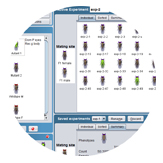Back to Seminar Archive List
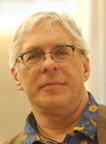 Professor Mike Klymkowsky
Professor Mike Klymkowsky
Seminar Topic: Bioliteracy, Concept Inventories, & Beyond… or how I evolved from a simple scientist to someone interested in effective science education
Seminar Date & Time: Friday, April 22, 2011 @ 2:30 pm
Location: Whitehead Institute Auditorium
Hosted by: The Education Group
Watch Professor Klymkowsky’s Seminar.
View the slides from Professor Klymkowsky’s Seminar.
It’s important to have a contractor check the foundation before you proceed with building a house. If the foundation is not sound, you probably should consider revising your goals. Professor Mike Klymkowsky used this analogy in his seminar, delivered at MIT on April 22, 2011, to illustrate the process of designing a course. A critical initial step in course design is the articulation of clear learning goals. But an equally important step is to determine whether or not students will arrive to the course prepared with the prerequisite knowledge and skills necessary to attain those defined learning goals.
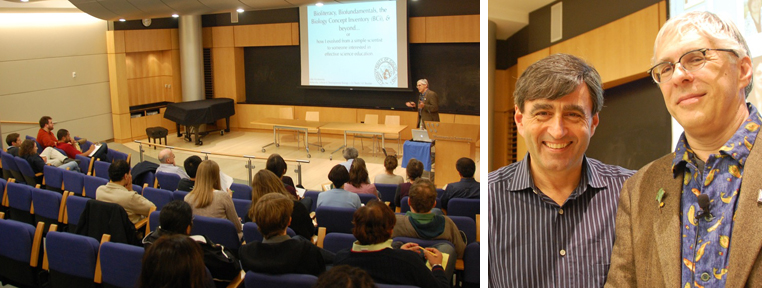
Left: Professor Mike Klymkowsky delivers a stirring seminar at MIT on April 22, 2011. Right: Professor Eric Mazur (Harvard University), in attendance at the seminar, with Professor Klymkowsky before his talk.
During his thought-provoking talk, Professor Klymkowsky raised concerns that faculty and instructors too often underestimate the need for students to come to their study of Biology with a strong conceptual foundation in the physiochemical principles of thermodynamics, reaction kinetics, molecular structure, and systems thinking. Rather than focusing on such “biofundamentals”, the Biology curricula that students typically encounter from grade school through their undergraduate studies consists of a fragmented collection of facts that can leave them lost in a conceptual vacuum without any meaningful understanding of the overarching principles that define biological systems.
Professor Klymkowsky suggested that many concepts in Biology are not particularly intuitive, offering as examples the mind-boggling central ideas that “a cell is a continuous object with a three billion year history” and “structure emerges out of randomness.” Students of all ages struggle with these and other fundamental concepts of Biology. Let’s face it: understanding evolution, entropic processes, and network behaviors isn’t easy.
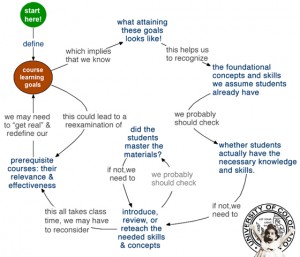
A flow-chart describing the logic of course design. Published in Klymkowsky, 2011, Getting serious about science education, ASBMB Today. Click to view larger image.
Bringing scientific rigor to the discussion, Professor Klymkowsky presented hard data. He shared findings from learning assessment studies (see reading list below) that bolster his argument. Some of these studies utilized the Biology Concept Inventory (BCi), developed by Klymkowsky, together with Sonia Underwood and Kathy Garvin-Doxas, to assess student thinking regarding the core concepts of Biology. To construct the BCi, more than 18,000 responses to a set of open-ended, short essay questions were collected from students at various institutions around the country. Samples from these response sets were analyzed using the Edʼs Tools system, which enabled the researchers to analyze the language used by the students in their essays. The analyzed responses were then used to structure one-on-one “think-aloud” interviews with students to garner a deeper understanding of their commonly harbored misconceptions. The interview transcripts supported the construction of a set of multiple-choice questions that, in addition to a correct response, present as possible answer choices the distractors that represent the common confusions identified for each evaluated concept. Follow-up interviews established that students who selected a particular answer did indeed hold the concept (correct or confused) that the answer was designed to represent. Since its development, the BCi has been administered across Biology curriculum at institutions throughout the United States and Europe, as well as to a group of middle school and high school science teachers who responded to a solicitation by the National Science Teachers Association. The results of these assessments reveal interesting misconceptions held by students at various curricular levels, and even by teachers!
For instance, when presented with the following scenario in the BCi:
“Imagine an ADP molecule inside a bacterial cell. Which best describes how it would manage to “find” an ATP synthase so that it could become an ATP molecule?”
Less than 25% of undergraduate Biology majors chose the correct answer:
“Random movements would bring it to the ATP synthase.”
Doing a bit better, 58% of teachers responded to this question correctly.
In his seminar at MIT, Professor Klymkowsky suggested that the reason why the role of randomness in biological processes is so poorly understood is because it is rarely encountered in typical curriculum. “A ribosome never is shown rejecting twenty to thirty tRNAs before it accepts one,” he pointed out.
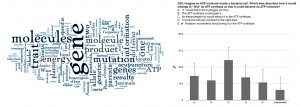
Left: The BCi word cloud. Right: A histogram showing student responses to a question in the BCi about randomness in biological processes. Click to view larger images.
Why is this widespread problem regarding misconceptions about fundamental biological concepts not obvious to most faculty and instructors? Professor Klymkowsky argued that traditional methods of assessment, such as quizzes and exams, don’t probe deeply enough into students’ conceptions and misconceptions. While unambiguous test questions might be relatively easy for instructors to grade, such questions can also allow students to recognize correct answers without actually understanding why an answer is correct. Professor Klymkowsky recommended to the audience an eye-opening publication called Ersatz Learning, Inauthentic Testing, by McClymer and Knoles, that carefully discusses this very issue.
Professor Klymkowsky spoke to a critical need for revision of traditional assessment methods, calling for the incorporation of more instances of formative assessment that would allow both students and professors to gain more insights from their interactions. Formative assessments enable instructors to recognize when students are having trouble with particular concepts and to respond earlier in the learning process. Such assessment methods are designed to promote learning by drawing instructorsʼ attention to areas where students are having problems that standard exams often fail to reveal. Formative approaches shift the focus of assessment away from its typical role of judging or sorting students, refocusing it on supporting and improving student learning.
Professor Klymkowsky discussed a range of formative assessment methods, including Socratic dialog and well-designed open-ended essay questions. A tool like the BCi can also be a useful formative diagnostic, particularly when students are asked to explain why wrong responses are wrong and the instructor listens to their answers. Professor Klymkowsky and collaborator Professor Melanie Cooper (Clemson University Department of Chemistry) are also developing a new web-based learning assessment system called BeSocratic that will recognize, respond to, and collect free-form student input—allowing a deeper view into student thinking than can be attained from multiple-choice assessment tools. Formative diagnostics can be performed in “real time” in the classroom by interspersing conceptual questions throughout the class period and collecting student responses to these questions either by using high-tech or low-tech “Clicker” systems or more advanced peer-instruction strategies, such as those utilized by Professor Eric Mazur of the Harvard University Department of Physics.
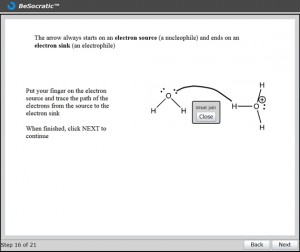
A screen shot from the "Arrow Pushing CLUE" example using the BeSocratic assessment tool, under development by Professors Cooper and Klymkowsky. Click to view larger image.
In a broader discussion about science education that followed the seminar, Professor Klymkowsky expressed worries that the current national standards for K-12 science education fall short of supporting meaningful teaching and learning. Professor Klymkowsky is concerned that these standards are too broad and too shallow. He hopes that other members of the academic community might also take a careful look at the standards to evaluate for themselves whether these frameworks can do a good job of supporting the type of learning and experiences that will be valuable for our nation’s next generation of scientists, scholars, and leaders. Perhaps professors and scientists active in our academic community could propose some helpful improvements.
Professor Mike Klymkowsky is a member of the Molecular, Cellular, and Developmental Biology (MCDB) Department faculty at the University of Colorado-Boulder, where he and members of his research lab study vertebrate development using the clawed frog Xenopus as a model system. He is also the Co-Director of Colorado’s innovative CU Teach Program, which offers opportunities for leadership training to University of Colorado undergraduates interested in science and mathematics education at all levels. In addition to his work to develop the BCi and BeSocratic, Professor Klymkowsky has done extensive work in the study of bioliteracy and has developed a series of virtual laboratories that are freely available online and used in the University of Colorado “Biofundamentals” Course— a “re-envisioning of what an introductory course in modern, mostly molecular biology should be.”
Readings referenced in Professor Klymkowsky’s talk:

